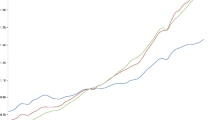Abstract
One of the most enduring contributions of Sir Karl Popper to the philosophy of science was his deductive approach to the scientific method, as opposed to Hilary Putnam’s absolute faith in science as an inductive process. Popper’s logic of discovery counters the whole inductive procedure that modern science is so often identified with. While the inductive method has generally characterized how scientists commence their work in laboratories, for Popper scientific theories actually start with generalizations inside our mind whose validity the scientific method must test until those come to be falsified. A step further in the scientific method is the function of paradigms that Thomas Kuhn’s revolutionary science has developed. Kuhn’s community and consensus-based approach and Popper’s hypothesis-based approach are both important in the development of science as it is. This paper seeks to show how models of development may be integrated in the above debate in order to derive insightful implications that are crucial to the understanding of economic progress and human development.
Similar content being viewed by others
Notes
Semiha Akinci, “Popper’s Conventionalism,” in Karl Popper: Critical Appraisals, edited by Philip Catton and Graham Macdonald. (London: Routledge, 2004), 32.
Phil Parvin, Karl Popper, (New York: Continuum, 2010), 39.
Ibid.
Ibid.
Ibid., 37
Karl Popper, “The Logic of Scientific Discovery,” in Philosophy of Science, edited by Richard Boyd, Philip Gasper and J.D. Trout. (Cambridge, Mass.: MIT Press, 1991), 100
Ibid.
Parvin, Karl Popper, 36
Akinci, “Popper’s Conventionalism,” 35
Popper, “The Logic of Scientific Discovery,” 100
Arnold Kluge, “Philosophical Conjectures and their Refutation,” Syst. Biol. 2001, 50(3): 323.
Popper, “The Logic of Scientific Discovery,” 100
Ibid
Ibid.
Ibid.
Kluge, “Philosophical Conjectures and their Refutation,” 325
Popper, “The Logic of Scientific Discovery,” 100
Akinci, “Popper’s Conventionalism,” 34
Albert Einstein, On the Theory of Relativity, (London: King’s College, 1921), 2
Parvin, Karl Popper, 42
Popper, “The Logic of Scientific Discovery,” 100
Ibid, 105
Parvin, Karl Popper, 35
Thomas Kuhn, The Structure of Scientific Revolutions, (Chicago: University of Chicago Press, 1962), 1–2
Ibid, 35
Ibid, 36
Joseph Stiglitz, Globalization and its Discontents, (London: Norton and Co., 2002), 7.
Ibid, 35
Parvin, Karl Popper, 43
Kuhn, The Structure of Scientific Revolutions, 46
Ibid
Ibid, 100
Ibid, 76
Ibid, 84
Alexander Bird, “What can cognitive science tell us about scientific revolutions,” in Theoria 75 (2012): 303.
Hilary Putnam, “The Corroboration of Theories,” in Philosophy of Science, edited by Richard Boyd, Philip Gasper and J.D. Trout. (Cambridge, Mass.: MIT Press, 1991), 100
Ibid, 122
Ibid.
Ibid.
Kluge, “Philosophical Conjectures and their Refutation,” 325
Ibid, 324
Ibid
Karen Fox, The Big Bang Theory, (New York: John Wiley and Sons, 2002), 42
Wenceslao Gonzales, “The Many Faces of Popper’s Methodical Approach to Prediction,” in Karl Popper: Critical Appraisals, edited by Philip Catton and Graham Macdonald. (London: Routledge, 2004), 81
Karl Popper, Conjectures and Refutations, (London: Routledge, 1989), 249; as found in Gonzales, “The Many Faces of Popper’s Methodical Approach to Prediction,” 81
Putnam, “The Corroboration of Theories,” 123
Kluge, “Philosophical Conjectures and their Refutation,” 325
Putnam, “The Corroboration of Theories,” 123
Ibid., 124
Popper, Conjectures and Refutations, 243; as found in Gonzales, “The Many Faces of Popper’s Methodical Approach to Prediction,” 81
Putnam, “The Corroboration of Theories,” 127
Ibid.
Ibid.
Ibid.
Ibid., 132
Stephen Hawking, A Brief History of Time, (London: Bantam Books, 1988), 5.
M. Shamsul Haque, Restructuring Development Theories and Policies. (New York: State University of New York, 1999), 48.
Jeremy Williams and Judith McNeill, “The current crisis in neoclassical economics and the case for economic analysis based on sustainable development,” 2005 Universitas 21 (5): 6.
Haque, Restructuring Development Theories and Policies, 59.
Ibid., 63
Ibid., 67
Jeremy Williams and Judith McNeill, “The current crisis in neoclassical economics and the case for economic analysis based on sustainable development,” 11.
Stiglitz, Globalization and its discontents, 22.
M. Shamsul Haque, Restructuring Development Theories and Policies, 77
Ibid.
References
Akinci, Semiha. (2004) “Popper’s Conventionalism,” in Karl Popper: Critical Appraisals, edited by Philip Catton and Graham Macdonald. London: Routledge.
Bird, A. (2012). What can cognitive science tell us about scientific revolutions. Theoria, 75, 293–321.
Einstein, A. (1921). On the theory of relativity. London: King’s College.
Fox, K. (2002). The big bang theory. New York: Wiley.
Gonzales, Wenceslao. (2004) “The Many Faces of Popper’s Methodical Approach to Prediction,” in Karl Popper: Critical Appraisals, edited by Philip Catton and Graham Macdonald. London: Routledge.
Haque, M. S. (1999). Restructuring development theories and policies. New York: State University of New York.
Hawking, S. (1988). A brief history of time. London: Bantam Books.
Kluge, A. (2001). Philosophical Conjectures and their Refutation. in Syst. O Biologico, 50(3), 322–330.
Kuhn, T. (1962). The Structure of Scientific Revolutions. Chicago: University of Chicago Press.
Parvin, P. (2010). Karl Popper. New York: Continuum.
Popper, K. (1989). Conjectures and refutations. London: Routledge.
Popper, Karl. (1991). “The Logic of Scientific Discovery,” in Philosophy of Science, edited by Richard Boyd, Philip Gasper and J.D. Trout. Cambridge, Mass.: MIT Press.
Putnam, Hilary. (1991). “The Corroboration of Theories,” in Philosophy of Science, edited by Richard Boyd, Philip Gasper and J.D. Trout. Cambridge, Mass.: MIT Press.
Stiglitz, J. (2002). Globalization and its discontents. London: Norton and Co..
Williams, J., & McNeill, J. (2005). The current crisis in neoclassical economics and the case for economic analysis based on sustainable development. Universitas, 21(5): 1–18.
Author information
Authors and Affiliations
Corresponding author
Rights and permissions
About this article
Cite this article
Maboloc, C.R. On the Scientific Methods of Kuhn and Popper: Implications of Paradigm-Shifts to Development Models. Philosophia 46, 387–399 (2018). https://doi.org/10.1007/s11406-017-9891-3
Received:
Revised:
Accepted:
Published:
Issue Date:
DOI: https://doi.org/10.1007/s11406-017-9891-3




